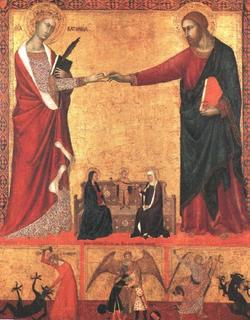Crusading Peace
The peace movement in Europe began as a movement to unite Christian Europeans against heretics and infidels. Tomaž Mastnak has documented the historical development of this movement through the period of the crusades in his Crusading Peace: Christendom, the Muslim World, and Western Political Order (Berkeley: University of California Press, 2002). Crusades were not seen as a form of war, but as a sacred blood sacrifice. Those who sought peace in Europe were exclusively opposed to the spilling of Christian blood by Christians. Although mysticism in all the world's religions is usually associated with love of all creatures and non-violence, there have been notable exceptions. Mastnak ends his book with a discussion of St. Catherine of Siena.  In the 1370's she promoted the return of the Pope to Rome from Avignon, peace among Christians, and a revival of the crusades to culminate in the Church's victorious march to Jerusalem. She viewed the crusade as a mystery of blood: "Just as Christ had shed his blood for the salvation of men, so Christians now had to shed their blood for Christ to free his patrimony from impious hands." (341) She described the crusade as a wedding feast. When Pope Gregory XI held an audience with Catherine, he explained to her that he wanted to make peace among the Christians so that he could then call them to a crusade. Catherine responded that there was no better way to make peace among Christians than by ordering a crusade. She believed that the result of the crusade would be the conversion of the Muslims, whom she described as "wicked unbelieving dogs". Mastnak continues: "The greatest minds of the Medieval Western world... as well as mystics and visionaries, all bent their heads and their knees before the spirit of the crusade. They all subscribed--rarely with silence, often with admirable eloquence--to the declaration that it was necessary to eliminate those who had been named infidels and declared enemies. This made the greatest minds at one with the mindless...." (345-346) Here we find reason for doubt about our motto, "Peace through Understanding." The profound understanding of the Middle Ages with all its subtlety and mystical insight was unable to imagine that there could be anything wrong with the most rapacious campaigns against the infidels. If peace can be achieved through understanding, what sort of understanding might that then be?
In the 1370's she promoted the return of the Pope to Rome from Avignon, peace among Christians, and a revival of the crusades to culminate in the Church's victorious march to Jerusalem. She viewed the crusade as a mystery of blood: "Just as Christ had shed his blood for the salvation of men, so Christians now had to shed their blood for Christ to free his patrimony from impious hands." (341) She described the crusade as a wedding feast. When Pope Gregory XI held an audience with Catherine, he explained to her that he wanted to make peace among the Christians so that he could then call them to a crusade. Catherine responded that there was no better way to make peace among Christians than by ordering a crusade. She believed that the result of the crusade would be the conversion of the Muslims, whom she described as "wicked unbelieving dogs". Mastnak continues: "The greatest minds of the Medieval Western world... as well as mystics and visionaries, all bent their heads and their knees before the spirit of the crusade. They all subscribed--rarely with silence, often with admirable eloquence--to the declaration that it was necessary to eliminate those who had been named infidels and declared enemies. This made the greatest minds at one with the mindless...." (345-346) Here we find reason for doubt about our motto, "Peace through Understanding." The profound understanding of the Middle Ages with all its subtlety and mystical insight was unable to imagine that there could be anything wrong with the most rapacious campaigns against the infidels. If peace can be achieved through understanding, what sort of understanding might that then be?

 In the 1370's she promoted the return of the Pope to Rome from Avignon, peace among Christians, and a revival of the crusades to culminate in the Church's victorious march to Jerusalem. She viewed the crusade as a mystery of blood: "Just as Christ had shed his blood for the salvation of men, so Christians now had to shed their blood for Christ to free his patrimony from impious hands." (341) She described the crusade as a wedding feast. When Pope Gregory XI held an audience with Catherine, he explained to her that he wanted to make peace among the Christians so that he could then call them to a crusade. Catherine responded that there was no better way to make peace among Christians than by ordering a crusade. She believed that the result of the crusade would be the conversion of the Muslims, whom she described as "wicked unbelieving dogs". Mastnak continues: "The greatest minds of the Medieval Western world... as well as mystics and visionaries, all bent their heads and their knees before the spirit of the crusade. They all subscribed--rarely with silence, often with admirable eloquence--to the declaration that it was necessary to eliminate those who had been named infidels and declared enemies. This made the greatest minds at one with the mindless...." (345-346) Here we find reason for doubt about our motto, "Peace through Understanding." The profound understanding of the Middle Ages with all its subtlety and mystical insight was unable to imagine that there could be anything wrong with the most rapacious campaigns against the infidels. If peace can be achieved through understanding, what sort of understanding might that then be?
In the 1370's she promoted the return of the Pope to Rome from Avignon, peace among Christians, and a revival of the crusades to culminate in the Church's victorious march to Jerusalem. She viewed the crusade as a mystery of blood: "Just as Christ had shed his blood for the salvation of men, so Christians now had to shed their blood for Christ to free his patrimony from impious hands." (341) She described the crusade as a wedding feast. When Pope Gregory XI held an audience with Catherine, he explained to her that he wanted to make peace among the Christians so that he could then call them to a crusade. Catherine responded that there was no better way to make peace among Christians than by ordering a crusade. She believed that the result of the crusade would be the conversion of the Muslims, whom she described as "wicked unbelieving dogs". Mastnak continues: "The greatest minds of the Medieval Western world... as well as mystics and visionaries, all bent their heads and their knees before the spirit of the crusade. They all subscribed--rarely with silence, often with admirable eloquence--to the declaration that it was necessary to eliminate those who had been named infidels and declared enemies. This made the greatest minds at one with the mindless...." (345-346) Here we find reason for doubt about our motto, "Peace through Understanding." The profound understanding of the Middle Ages with all its subtlety and mystical insight was unable to imagine that there could be anything wrong with the most rapacious campaigns against the infidels. If peace can be achieved through understanding, what sort of understanding might that then be?




1 Comments:
We've enjoyed having the chance to read your blog since getting back to Iran. Matt and Laurie
Post a Comment
<< Home